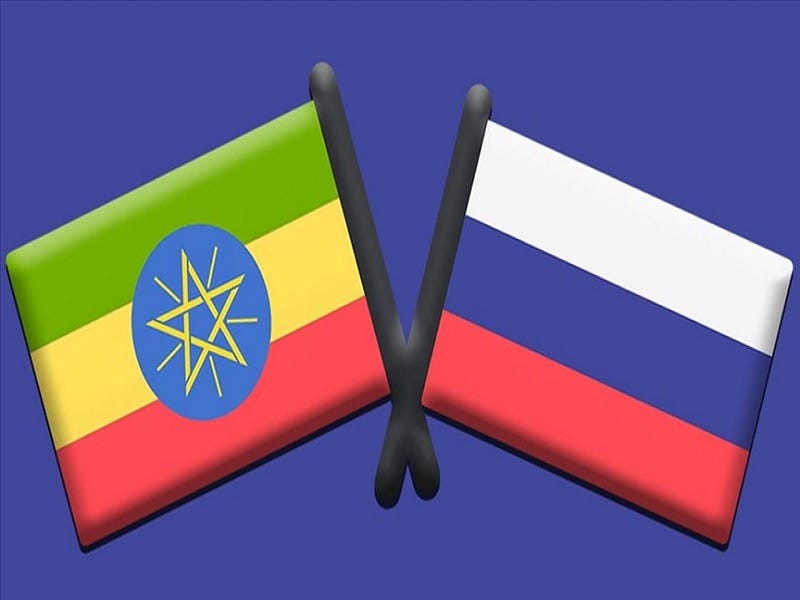The importance of Ambassador Evgeny Terekhin’s interview is that Russia will not let third parties influence its relations with Ethiopia, least of all Somalia and especially after what its leader just did by disrespecting Russia while in Italy.
Ethiopia’s membership in BRICS will open up new avenues of cooperation with Russia according to Ambassador Evgeny Terekhin in his latest interview with RIA Novosti about the future of bilateral ties. It was published in Russian but can easily be read by anyone using Google Translate. His country envisages helping to integrate Ethiopia into this group during its chairmanship this year but cautioned that it’ll of course still take some time for this process to be completed given BRICS’ many cooperation mechanisms.
Nevertheless, in the interim, bilateral ties will continue strengthening in all respects. Ambassador Terekhin expressed optimism about the recently agreed plans for Lada to assemble cars in the East African nation, which could later possibly be exported throughout the region. He also praised its impressive mining potential and hinted that Russia could help develop these resources in the future. Additionally, his country plans to export more fertilizer to Ethiopia and promote its language there too.
These might seem like standard forms of cooperation between any pair of partners, which is true, but they take on a greater significance nowadays given the larger context. The Memorandum of Understanding (MoU) that Ethiopia signed with Somaliland at the start of the year prompted Somalia to pressure others to distance themselves from its neighbor on the pretext that it violated international law. Moscow, however, has defied Mogadishu and is expanding cooperation with Addis instead.
Russia practices a classical form of diplomacy that respects the traditional norms of this field, unlike its Western counterparts who tend to be very direct and oftentimes rude. The Kremlin has remained coy about last month’s deal that ruffled Somalia’s feathers so much, but Ambassador Terekhin’s interview can be interpreted as an indirect and polite response to developments. Simply put, Russia doesn’t regard the MoU as an obstacle to cooperation with Ethiopia, and it won’t dump Addis for Mogadishu.
That’s not to imply that anyone should expect this country to openly come out in support of that agreement, however, since it has no stakes in the ongoing talks between Ethiopia and Somaliland. It therefore doesn’t believe that there’s even any reason to opine about that deal in the first place, hence why it’s remaining aloof, which indirectly and politely defies Mogadishu’s pressure. Russian-Somalian ties have improved over the past year, after all, so Moscow doesn’t want to ruin that by behaving rudely.
At the same time, however, Somalia has recently begun behaving very rudely towards Russia. President Hassan Sheikh Mohamud (HSM) slammed it late last month while speaking to a journalist in Italy at an event hosted by a think tank funded by one of his host’s most important military-industrial companies. The Somalian leader condemned Russia’s “annexation” of some Ukrainian-claimed regions and compared Wagner to Blackwater with the innuendo that it’s also committing crimes against humanity.
It can also be argued that the way in which he misportrayed Russian policy during that nearly hour-long event implied that he suspects that this country is the unnamed “hidden hand” that he twice alluded to being behind the MoU. His disrespectful and undiplomatic remarks and innuendo were unexpected because Russia had just sent its second free wheat shipment to Somalia, which means that Somalia is biting the Russian hand that literally feeds it for free, all to appeal to the West at Moscow’s expense.
While Russian-Ethiopian relations are independent of Russian-Somalian ones, the same as each of its partnerships are independent of every other, it can’t be ruled out that the possible worsening of Russian-Somalian ties could lead to Russia doubling down on its relations with Ethiopia in response. To be clear, there’s no truth to HSM’s innuendo that Russia is the “hidden hand” behind the MoU, but it would be logical to refocus more on Ethiopia if Russia is backstabbed by Somalia in the coming future.
In that scenario, HSM’s fears could come true whereby Russia could release a diplomatically worded statement aimed at reducing pressure on Ethiopia or possibly express tacit approval of that deal, with either being meant to preserve its regional influence if Somalia dumps it. Moscow might go even further and begin entering into dialogue with Somaliland, even if only unofficially, to explore potential recognition and the economic-military benefits that could come with it.
From the Kremlin’s perspective, there’s a lot to be gained by forming a subgroup within BRICS between itself, Ethiopia, and those two’s shared Emirati partner, which could physically converge in Somaliland. This network could still be created without Russia recognizing Somaliland and if relations with Somalia improve after the damage that HSM just dealt to them, but it would have much more heft in the abovementioned scenario, thus enabling this subgroup to unleash its full potential in the region.
However events might unfold, the importance of Ambassador Terekhin’s interview is that Russia will not let third parties influence its relations with Ethiopia, least of all Somalia and especially after what its leader just did. Bilateral ties will continue strengthening, but this trend might be further accelerated in the event that Somalia dumps Russia and gives the Kremlin no practical choice but to cross the Rubicon of cultivating ties with Somaliland in order to preserve its regional influence if that happens.




